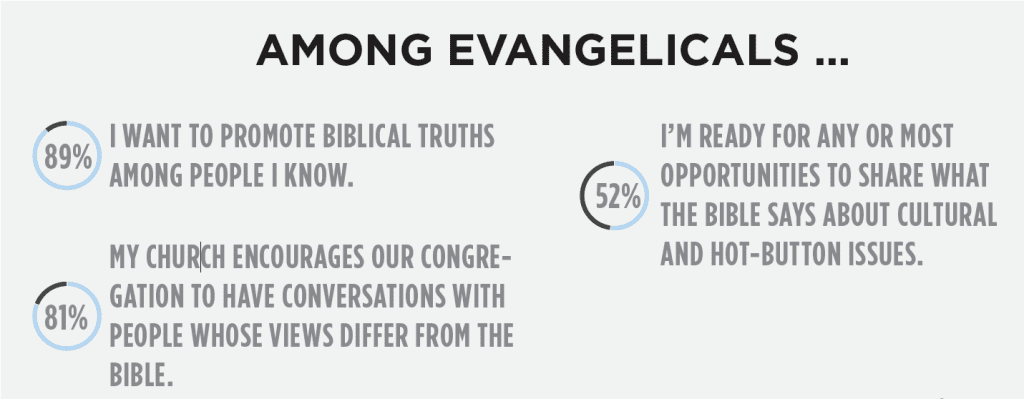As our culture shifts, the contrast between Christian beliefs and the beliefs assumed in our society becomes more pronounced. It is time we consider how our local church is (or is not) adjusting to this reality.
The perspective of evangelicals in the U.S. can give some insights on both positive foundations and areas where significant changes are needed. These insights come from a Lifeway Research study on Christian cultural engagement conducted in partnership with the Institute for Faith & Culture.

Our Role in Culture
The good news is that almost 9 in 10 evangelicals (89%) want to promote biblical truths among people they know. And 93% want to demonstrate biblical compassion to those outside their church. Both statements are personal. Evangelicals are not saying somebody “needs” to. They are agreeing, “I want to …” Your congregation likely already has these positive motivations.
Affirm these desires in your congregation. Continue to teach the underlying biblical principles so there is no hesitation. Jesus told his followers, “You are the salt of the earth” (Matt. 5:13a). He assigned us this role of preserving and enhancing our society.
Similarly, he said, “You are the light of the world. … Let your light shine before others, so that they may see your good works and give glory to your Father in heaven” (Matt. 5:14a, 16). These instructions immediately follow the Beatitudes. The good works we as light are to be showing are those like mercy, humility, peacemaking and purity.
With so many motivated believers, we have great potential to impact our culture in the name of Jesus Christ. We can praise this desire, while also recognizing some warning signs. Almost a quarter of evangelicals (24%) say they have given up on our culture and don’t try to influence it in any way. Additionally, one-third only somewhat disagree, hinting there are times when they aren’t trying to be a biblical influence.
Tell a Friend.
Church leaders can motivate believers to act on their desires to impact our culture by first encouraging them to talk to people outside the church. Eight in 10 evangelicals (81%) agree their church encourages them to have conversations with people whose views differ from the Bible, but less than half (47%) strongly agree. Another third (34%) somewhat agree, 9% disagree and 11% are not sure.
Paul’s letter to the Colossian church singles out the need for a verbal witness. He tells them to devote themselves to prayer and then specifically gives them a prayer request: “Pray also for us that God may open a door to us for the word, to speak the mystery of Christ” (Col. 4:3). It is easy to say our goal is to tell others about Jesus Christ, but we often skip the step of asking God to make this possible.
Paul goes on to say, “Act wisely toward outsiders, making the most of the time. Let your speech always be gracious, seasoned with salt, so that you may know how you should answer each person” (Col. 4:5–6).
While highlighting the urgency of non-Christians having a limited time to choose to follow Jesus, Paul says our actions should be wise and our words gracious. We cannot push anyone into a relationship with Jesus Christ. Instead, our conversations should be seasoned with salt—the same salt Jesus mentioned in Matthew 5.
While we are praying for opportunities to share, we must also be preparing. Over 3 in 4 evangelicals (78%) agree their church prepares their congregation to have conversations with people whose views differ from the Bible. But, only 38% strongly agree with this statement, while 40% somewhat agree, 13% disagree and 10% are not sure. Many churches have the necessary resources loaded each week but fail to prioritize preparation. (See Sean McDowell’s article, “A New Horizon: What Cultural Shifts Mean for Apologetics Today,” for more insights.)
Most of the Scripture already being taught at your church each week would be helpful in conversations churchgoers have with the outsiders Paul is talking about. Yet the content is often delivered and consumed as if it is only for those in the worship center or Bible study.
Would the key points in your sermons make sense to a non-Christian if your congregation repeated them at work the next day? Could that be a goal in sermon preparation? When you know important points would be helpful in a conversation with a nonbeliever, encourage the congregation to share that truth outside the church.
Similarly, Bible study leaders can be trained and encouraged to frequently make this a point of application. Good Bible study curriculum will have prompts and discussion suggestions for sharing key takeaways with others, but it is easy for leaders to ignore these prompts if this goal is not prioritized.
Time to Prepare
Peter instructs believers to be “ready at any time to give a defense to anyone who asks you for a reason for the hope that is in you” (1 Peter 3:15b). Yet only half of evangelicals (52%) say they are ready for any or most opportunities to share what the Bible says about cultural and hot button issues. Another third (32%) are only ready to discuss a few truths they know well, 9% are not ready for most opportunities, and 5% are not ready at all to share what the Bible says.
This is the biggest gap between the 9 in 10 evangelicals who desire to share truth and love outside the church and the half who say they are truly ready to do so. Well-intentioned believers are starving for teaching that equips them to explain what the Bible teaches on issues where many in our culture have reached a different conclusion.
Have you asked your congregation what topics they feel least prepared to discuss? Would topical Bible studies addressing these issues fit within your current programming? Do you need to offer something new to help equip your church?
In addition to direct teaching and explanation, believers can also learn by watching others have these conversations seasoned with salt. Almost 6 in 10 evangelicals (59%) agree their church intentionally creates environments to discuss differences between our culture’s values and the Bible’s, but only about 1 in 5 (22%) strongly agree. There is room in most of our churches to better model sharing scriptural truths with non-Christians.
As you evaluate your church’s readiness to engage our culture with biblical truths, there is likely much you can build on. But this season also requires wisdom and intentionality to discover and correct some areas of weakness so that your congregation is equipped for this task.

